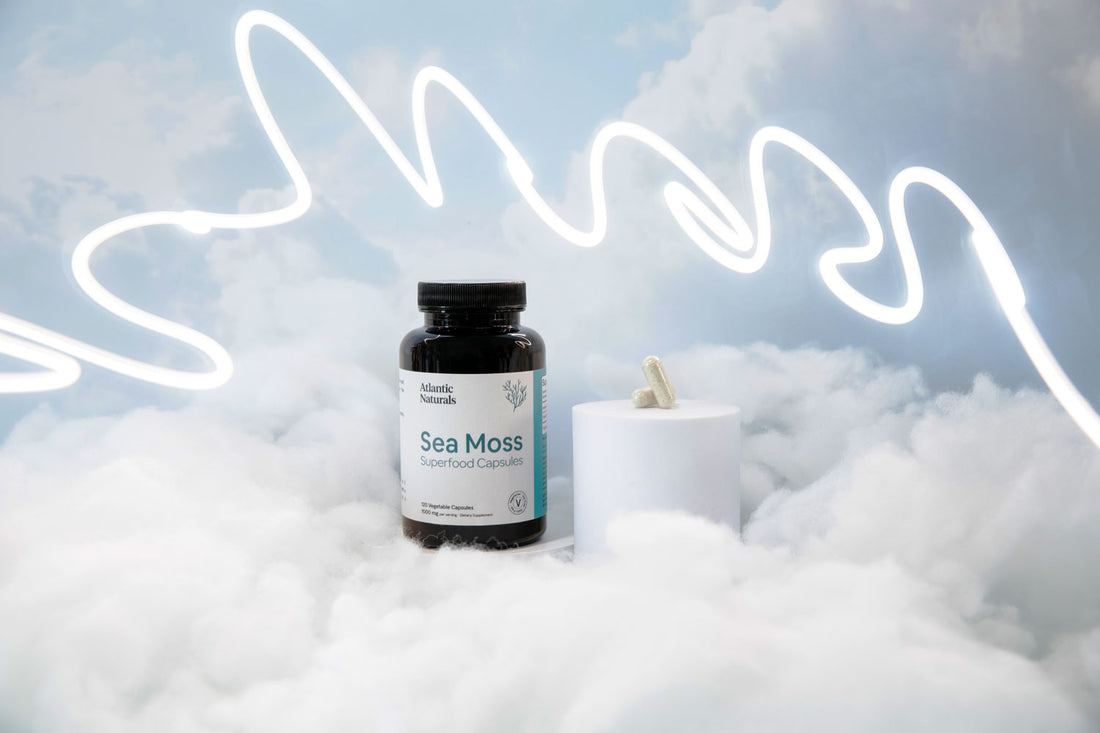
Share
8 Unique Sea Moss Benefits for Women
Sea Moss, an algae harvested from the Atlantic Ocean and the Caribbean, can be red, green, black, yellow, purple, or brown. It is similar to seaweed or other sea vegetables in that it is safe to consume.
While it has been used as a dietary supplement in various regions throughout history, it has become more mainstream in recent years. You can purchase sea moss in supplement form or raw, and it has many health benefits for women.
Is Sea Moss Good For You?
Sea Moss is nutrient-rich and has many potential health benefits. It is still being studied to help science clarify the full scope of the algae's benefits. However, two tablespoons — roughly 10 grams — of Sea Moss contains the following nutrients:
- Protein (0.15 g)
- Iodine (470 mg)
- Iron (0.89 mg)
- Copper (0.02 mg)
- Magnesium (14.4 mg)
- Manganese (0.04 mg)
- Zinc (0.195 mg)
- Vitamin B2 (0.05 mg)
- Vitamin B6 (0.01 mg)
- Vitamin B8 (18.2 mcg)
Sea Moss Benefits for Women
Women in Jamaica, Scotland, and Ireland have been adding Sea Moss to their diets for centuries, and now women in other cultures are starting to catch on to the benefits of ingesting these algae.
In fact, the International Food Additives Council states people in Ireland have been harvesting Sea Moss for over 14,000 years. During the potato famine in the 1800s, Irish people supplemented their diets with Sea Moss.
While you may not need to survive a famine, there are still many reasons to add Sea Moss to your diet.
1. Promotes Thyroid Health
One of the essential minerals needed for a properly functioning thyroid is iodine and Sea Moss in an excellent source. The thyroid is located at the base of the neck. This small gland is responsible for regulating several body functions, including metabolism and mood.
In a 2014 study, women who ingested 0.5 grams of Sea Moss per day improved their iodine levels and had an increased level of TSH (thyroid-stimulating hormone.)
TSH is crucial in regulating weight, body temperature, mood, and energy production.
2. Supports Immune System
On the heels of a global pandemic, having a healthy immune system is something that many people are worried about. The immune system is the body's defense against viruses, bacteria, and inflammation. People have been using Sea Moss to ward off colds and relieve flu symptoms for hundreds of years.
The potassium chloride found in Sea Moss can help the body fight off infections and reduce inflammation. Other nutrients found in Sea Moss, like iron, also help build a healthy immune system.
A study of Atlantic salmon showed that those who consumed Sea Moss had better immune system responses than those that did not eat Sea Moss.
3. Supports Healthy Digestion
Sea Moss has a high fiber content — higher than many of the commonly consumed vegetables. A high in fiber diet is excellent for the digestive system as it increases stool weight and size. A high fiber diet decreases constipation, helping to maintain proper bowel health.
A 2015 study conducted on rats showed Sea Moss had prebiotic effects on the rats' gastrointestinal systems. The rats that were given Sea Moss showed an increase in the healthy gut bacteria.
4. Promotes Cardiovascular Health
Sea Moss is an excellent plant-based source of omega-3 fatty acids, which are essential in maintaining a healthy cardiovascular system. Omega-3s have been shown to lower the risk of heart disease, decrease cholesterol levels, help prevent blood clots, and helps regulate blood pressure.
Sea Moss is also a great source of potassium which plays its own role in preventing elevated blood pressure levels. Potassium helps lower blood pressure by balancing the body's sodium levels.
In addition to potassium and omega-3s, Sea Moss also contains fucoidan, which can be used as a natural blood thinner, helping to prevent blood clots.
5. Supports Weight Loss
As a dietary supplement, Sea Moss can help promote weight loss in women and men! It is low in calories — only five calories in two tablespoons. Plus, it is also low in carbs.
Besides being appropriate for low calorie and low carb diets, Sea Moss can also help regulate the appetite, help your body maintain a healthy metabolism, and regulate the good bacteria in the gut.
Sea Moss contains carrageenan, which has been shown to prevent weight gain in some studies. It has also been shown to reduce body fat by lowering fat absorption, preventing the creation of new fat cells, speeding up the breakdown of stored fat, and promoting "fat burning."
6. Aids Workout Recovery
For women who work out, Sea Moss can help with recovery and building muscle due to the amount of taurine, an amino acid, found in the algae. Amino acids help the body recover from the micro-tears that occur during the workout.
In addition to taurine, Sea Moss is also a good source of protein which is essential for getting the best results from your exercise regimen. (It is important to consult a doctor before starting any strenuous exercise program.)
7. May Support Fertility
Research has shown that nutrition can often play a significant role in fertility and the ability to conceive. Three nutrients may be the key to unlocking fertility, and they are found in Sea Moss!
Vitamin B-9 (folate) has been shown to boost fertility in women who have short menstrual cycles or who have irregular periods by 15 percent. The Mayo Clinic recommends "400 to 1,000 mcg of folic acid a day" for women who are attempting to conceive.
We've already discussed the ways iodine is beneficial to the thyroid gland, but it is also a critical nutrient needed while pregnant and when trying to conceive. Consuming the recommended dosage of 2 tablespoons per day can help maintain the required iodine levels.
Iron is also vital to fertility. Research suggests a strong link between iron intake and healthy ovaries, and most doctors will recommend up to 27 mg of iron each day for women who would like to conceive. Sea Moss contains a higher ratio of iron per 100 grams than chicken!
8. Acts Like a Prebiotic
Prebiotics are fibers that feed the friendly bacteria in your stomach — often known as the gut microbiota.
Research suggests that the bacteria in your stomach may influence your risk of obesity because they control energy expenditure ad energy storage.
Since prebiotics improve gut flora, they have the potential to lower the risk of obesity.
How to Take Sea Moss
Scientists worked hard to come up with an appropriate daily dose, and it should be matched with a consistent diet regimen.
A daily dose of 1-2 teaspoons (4-8 grams) of Sea Moss Gel is advised, and the suggested daily dose of Sea Moss capsules is 1000mg. It is not recommended that the suggested dose be exceeded a great deal.
Since Sea Moss does not have a strong flavor it is easy to add to your favorite recipes. You can also add it to smoothies, cakes, cookies, sauces, soups, and even ice cream.
The Sea Moss capsules, on the other hand, are the simplest and most basic way to take this supplement. There's no need to worry about getting the measurements wrong or how it'll turn out in your recipe!
Who Should Not Take Sea Moss?
While there are many health benefits to adding Sea Moss to your diet, there are some people that should not consume this natural supplement. Due to certain compounds and nutrients found within Sea Moss — namely the iodine, sulfa, and carrageen — some people need to avoid the algae. However, everyone should consult a doctor before adding any new supplement to their diet.
Pregnant Women: As with many supplements and dietary aids, there is little to no research done on its effects during pregnancy. Sea Moss does contain substantial levels of iodine which can cause complications during pregnancy. Plus, there are some compounds in the algae that may stimulate contractions leading to premature labor.
Breastfeeding Women: As mentioned above, little to no research is done on the effects of dietary supplements while breastfeeding. It is possible for the components of Sea Moss to pass through the milk and affect the baby.
Women with a History of Kidney Stones: Since Sea Moss is so rich in potassium, it can cause issues for people with kidney complications. Excess potassium builds up in the blood and can cause serious health issues.
Women Taking Medications: It is best to seek medical advice before adding Sea Moss to your diet for those taking prescribed medications for medical conditions. It is possible that Sea Moss is contraindicated with specific medicines — especially those that regulate blood pressure or manage diabetes.
Women with Autoimmune Disorders: Sea Moss is not recommended for those living with autoimmune disorders. Symptoms may worsen when adding this alga to your diet, especially in women diagnosed with lupus, rheumatoid arthritis, and Crohn's disease.
Women with Shellfish or Seafood Allergies: Sea Moss can trigger an allergic response in people who are allergic to shellfish or other types of seafood. If you have severe allergies, you should avoid Sea Moss. However, even if you are only sensitive to seafood and shellfish, you should consult with your physician before adding Sea Moss to your diet.
Women with Sulfa Allergies: Sulfa is an ingredient found in many medications, and it can cause severe allergic responses in some people. Those that suffer from sulfa allergies should also avoid Sea Moss.
Side Effects of Sea Moss
Sea moss is generally considered to be healthy. It includes varying amounts of excellent nutrients, but there is always a possibility of side effects with any dietary supplement.
Beth Czerwony, RD, a registered dietician, explains: “Sea moss is a product of its environment, so its nutritional value depends largely on where it’s grown. Unfortunately, there’s no real way to know exactly what’s in it or how much, and one batch may have higher potency than the next one.”
When it comes to side effects, there are two major dangers.
1. Consuming Too Much Iodine
There is always the capacity for excess, even if you consume something needed by the body, like iodine. Too much can negate any of the positive results you were hoping to gain. In fact, many endocrinologists advise against taking iodine supplements unless your doctor specifically instructs you to do so, as they may harm your thyroid.
Consuming too much iodine can give you nausea, vomiting, and diarrhea symptoms. An overdose of iodine can lead to stupor, delirium, and shock.
2. Consuming Heavy Metals
Heavy metals are known to be absorbed by seaweed and algae from the water in which it grows. Although it is not dangerous in modest doses, you should avoid consuming too much, increasing your risk of heavy metal exposure.
Heavy metal poisoning can occur when they build up within your system. How the poisoning presents depends on the type of metal you are exposed to and its toxicity level. Chronic exposure and consumption of heavy metals can lead to:
- Headache
- Weakness
- Tiredness
- Muscle pain
- Joint pain
- Constipation
- Confusion
- Numbness
Sea Moss: The Ocean’s Superfood!
The edible seaweed Sea Moss has a number of health benefits. It can easily be added to your morning smoothie, and it contains 15 of the essential 18 nutrients that people need for a healthy lifestyle. It is even making an appearance in skincare products! Women will find so many benefits to adding Sea Moss to their diets. If you're ready to give this superfood a try, click here to shop out Organic Sea Moss Superfood Capsules!

